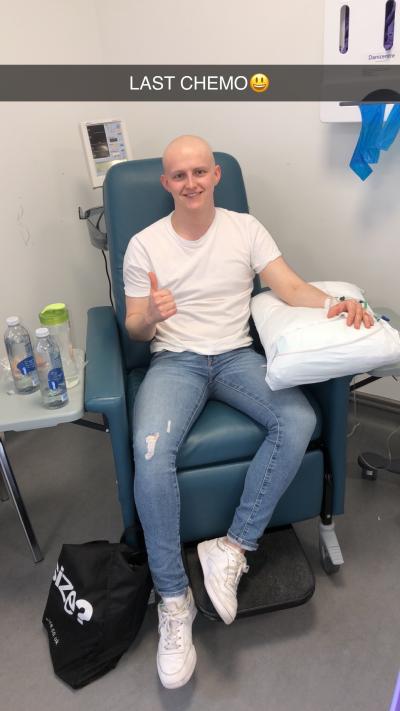There's no 'right way' to react to being diagnosed with cancer
Different people will have different ways of coping with cancer diagnoses, and being diagnosed can be a life-changing moment in anyone’s life. You might feel shocked, confused or angry or upset, some people take it in their stride, or even feel relieved that they finally know what has been making them feel unwell. What is important to remember is all these responses are completely understandable.
It’s not surprising that people have a wide range of reactions to being diagnosed with cancer, it makes sense when you consider that we all have different personalities and coping mechanisms. Young people who have shared their stories with us over the years all have different diagnoses and experiences shaped by their own characters, ways of coping, and where they are in their lives. Some reactions may be more common than the others, but there’s no “right” way to react to being told you have cancer.
It’s very common to feel overwhelmed by your cancer diagnosis. Looking back on when he was first told he had cancer, Ben said “the nurse said it looked like I’d been physically pushed back on my chair, and I couldn’t say anything. They said: ‘Ben, can you give us a reaction, and that you understand what we’ve said?’ I said yes and left the room. I just needed to get out of there”.
Similarly, Alex shared – “It felt very movie-like, the doctor was talking but everything had gone silent and distorted for me, and I took nothing in”. Eilidh was overwhelmed in a different sense, and said she “experienced an overwhelming amount of anger, I suppose at the world, and went into denial about what was happening to me”. Rosa also found it hard to accept her diagnosis, deciding to continue her work as an actor as if nothing had happened, though she soon realised that wasn’t possible.
Instead of crying, I broke into singing It’s a Hard Knock Life from Annie.. The nurses all looked at me like: ‘Are you ok? You’ve just been told that you have something that means you may die, and this is how you react.’ But it’s my way to tackle things with a sense of humour.
Some people will find it harder than others to get their heads around their diagnosis and some people’s coping methods come out in unexpected ways. Nowhere is this clearer than with Dan. He told us that “when a doctor told me that he thought I had Hodgkin lymphoma, my reaction wasn’t what they expected. Instead of crying, I broke into singing It’s a Hard Knock Life from Annie. The nurses all looked at me like: ‘Are you ok? You’ve just been told that you have something that means you may die, and this is how you react.’ But it’s my way to tackle things with a sense of humour”.
Ryan also found himself responding in a way that may seem strange to some. He explained – “When I was told that I had Hodgkin lymphoma, I was happy in a way because I finally knew why I felt so ill. It wasn’t just me, there was actually a reason. The doctor was great too and told me that my chances of going into remission were really high. I just thought: ‘It’s happened, now I just need to power through it.’ My girlfriend Jess accepted it really quickly too. We both had suspicions that it was going to be cancer, but we didn’t let on to each other. In a way, that prepared us”.
Dan, Eilidh, Ben, Rosa, Ryan and Alex all had different experiences of being diagnosed

Dan

Eilidh

Alex

Ryan

Rosa

Ben
Evidently, reactions to cancer diagnosis go through the full range of human emotions. What is important to remember is that firstly, there’s no ‘right way’ to respond. Try to allow yourself to open up about your feelings rather than holding everything in, whatever those feelings might be.
Secondly, remember, you are not alone. Though cancer can feel isolating, there are lots of people around who are there to support you, including your care team, as well as many other young people who are going through similar experiences.
Finally, once you have taken things in, take the time to speak to your care team and ask them all of the questions you have. Try not to feel embarrassed if you want to know more about topics that might be a bit awkward or uncomfortable. This is what your care team are there for and there’s a good chance they’ve heard the same questions before. It’s better to know the answers than have doubts hanging over your head.
